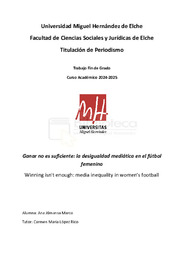Por favor, use este identificador para citar o enlazar este ítem:
https://hdl.handle.net/11000/37503Registro completo de metadatos
| Campo DC | Valor | Lengua/Idioma |
|---|---|---|
| dc.contributor.advisor | López Rico, Carmen María | - |
| dc.contributor.author | Almansa Marco, Ana | - |
| dc.contributor.other | Departamentos de la UMH::Ciencias Sociales y Humanas | es_ES |
| dc.date.accessioned | 2025-09-24T08:07:21Z | - |
| dc.date.available | 2025-09-24T08:07:21Z | - |
| dc.date.created | 2025 | - |
| dc.identifier.uri | https://hdl.handle.net/11000/37503 | - |
| dc.description.abstract | En 2023, el fútbol femenino español marcó un hito histórico al obtener su primer Mundial, aunque los medios de comunicación no lo apoyaron como se esperaba. La cobertura fue menor, más superficial y con un seguimiento inferior al que obtuvo la selección masculina después de su triunfo en la Eurocopa de 2024. Esta discrepancia no es casual: se debe a una estructura de medios que aún relega el deporte femenino a un segundo lugar. En las publicaciones deportivas, las mujeres apenas tienen espacio y los enfoques informativos continúan caracterizados por estereotipos y un lenguaje sexista. Este reportaje examina esa brecha informativa mediante entrevistas a periodistas como Paloma del Río, Silvia Rived, Laia Bonals y Marta Griñán, quienes relatan las dificultades a las que se encuentran tanto ellas como las propias atletas desde dentro. Además, incluye la declaración de Aitziber Juaristi Caballero, una ex jugadora, quien destaca la falta de interés por parte de los medios como uno de los principales obstáculos para el buen desarrollo del fútbol femenino. Conjuntamente con el trabajo de campo, la información se basa en una extensa bibliografía académica e informes recientes acerca de la representación de género en los medios de comunicación deportivos, junto con el estudio de coberturas específicas de ambos campeonatos. La conclusión es visible: los éxitos de las futbolistas no son suficientes si los medios de comunicación no relatan su trayectoria con el mismo rigor y pasión. La transformación implica por publicaciones más variadas, una mayor cobertura más extensa y una menor condescendencia respecto al deporte que practican las mujeres. Solo de esta manera se podrá crear una narrativa más equitativa e inclusiva. Sin visibilidad no existen referentes. Y sin referentes, la igualdad en el deporte no tiene futuro. | es_ES |
| dc.description.abstract | In 2023, Spanish women's football marked a historic milestone by winning its first World Cup, although the media did not support it as expected. The coverage was less, more superficial and with a lesser following than that of the men's national team after their triumph at Euro 2024. This discrepancy is not accidental: it is due to a media structure that still relegates women's sport to second place. In sports publications, women have hardly any space and the reporting approaches are still characterised by stereotypes and sexist language. This report examines this information gap through interviews with journalists such as Paloma del Río, Silvia Rived, Laia Bonals and Marta Griñán, who describe the difficulties they and the athletes themselves face from the inside. It also includes the statement of Aitziber Juaristi Caballero, a former player, who highlights the lack of interest on the part of the media as one of the main obstacles to the good development of women's football. In conjunction with the fieldwork, the information is based on extensive academic literature and recent reports on gender representation in the sports media, together with the study of specific coverage of both championships. The conclusion is visible: the successes of female footballers are not enough if the media do not report on their careers with the same rigour and passion. The transformation implies more varied publications, more extensive coverage and less condescension towards women's sport. Only in this way can a more equitable and inclusive narrative be created. Without visibility, there are no benchmarks. And without role models, there is no future for equality in sport. | es_ES |
| dc.format | application/pdf | es_ES |
| dc.format.extent | 43 | es_ES |
| dc.language.iso | spa | es_ES |
| dc.publisher | Universidad Miguel Hernández | es_ES |
| dc.rights | info:eu-repo/semantics/openAccess | es_ES |
| dc.rights | Attribution-NonCommercial-NoDerivatives 4.0 Internacional | * |
| dc.rights.uri | http://creativecommons.org/licenses/by-nc-nd/4.0/ | * |
| dc.subject | visibilidad | es_ES |
| dc.subject | desigualdad | es_ES |
| dc.subject | medios de comunicación | es_ES |
| dc.subject | género | es_ES |
| dc.subject | referentes | es_ES |
| dc.subject | visibility | es_ES |
| dc.subject | inequality | es_ES |
| dc.subject | mass media | es_ES |
| dc.subject | gender | es_ES |
| dc.subject | referents | es_ES |
| dc.subject.other | CDU::0 - Generalidades.::070 - Periódicos. Prensa. Periodismo. Ciencias de la información | es_ES |
| dc.title | Ganar no es suficiente: la desigualdad mediática en el fútbol femenino | es_ES |
| dc.type | info:eu-repo/semantics/bachelorThesis | es_ES |

Ver/Abrir:
PER_TFG_ ALMANSA_MARCO_ANA.pdf
12,64 MB
Adobe PDF
Compartir:
 La licencia se describe como: Atribución-NonComercial-NoDerivada 4.0 Internacional.
La licencia se describe como: Atribución-NonComercial-NoDerivada 4.0 Internacional.
.png)